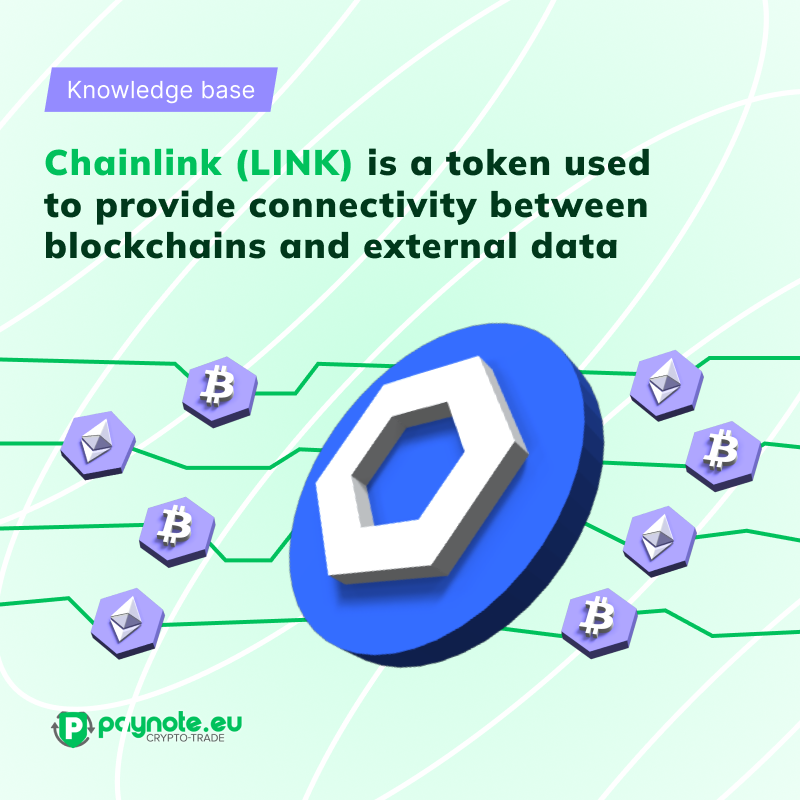
Blockchain technology has changed the way the world interacts with data and digital assets. However, one of the main limitations of blockchain is its isolation and the inability to obtain data from external sources. This is where Chainlink (LINK) comes into play – a cryptocurrency token and platform designed to provide a link between blockchains and external data.
Introduction to Chainlink
Chainlink (LINK) is a decentralized platform designed to connect blockchains with external data. The platform allows smart contracts on the blockchain to access real-world information such as stock prices, weather conditions, sports scores, and more. Chainlink overcomes one of the main limitations of the blockchain, making it a valuable asset in the world of decentralized applications (DApps).
How does Chainlink work?
Chainlink works by acting as an intermediary between blockchains and external data. Here are the main components of its work:
- Data Provider Nodes : These are nodes on the Chainlink network that receive information from external data sources, such as financial market APIs or weather data.
- Data Provider Contracts : These contracts on the blockchain describe the conditions and parameters under which data is to be obtained. They also define the reward for providing the data.
- Oracle Nodes : These nodes receive data from data provider nodes and feed it into smart contracts on the blockchain. They also verify the authenticity of the data to ensure the reliability of the information.
- Smart Contracts : Smart contracts on the blockchain that use the data provided by Chainlink. These contracts can perform different actions depending on the data received, making them intelligent and automated.
Why do we need Chainlink?
There are many practical applications for using Chainlink, and here are a few key areas:
- Financial Markets : Cryptocurrency exchanges and decentralized financial applications can use Chainlink to access up-to-date price data on assets and currencies.
- Insurance : Decentralized insurance applications can use Chainlink to obtain insurance claim data and statistics, which helps them determine insurance premiums and payouts.
- Gambling Industry : Online casinos and sports betting can use Chainlink to retrieve event results and lock in bet outcomes.
- Data Providers : Chainlink provides new opportunities for data providers such as financial institutions, weather services, and others to monetize their data through smart contracts.
Token LINK
The LINK token is a key element of the Chainlink ecosystem. It performs several important functions:
- Payments : LINK is used to pay rewards to data provider nodes and oracle nodes for providing data and executing smart contracts.
- Voting : LINK holders have the ability to participate in votes and make decisions about various network parameters, such as the size of rewards for data producer nodes.
- Staking : LINK can be staked to ensure the reliability and security of the network. Oracle nodes that stake LINK have a greater incentive to provide accurate data and not violate the rules.
- Contract Creation Reward : LINK is also used to pay for the creation of new data provider contracts on the Chainlink network.
Benefits and Challenges
Advantages of Chainlink
- Decentralized : Chainlink provides access to external data without having to trust one centralized data provider.
- Data Reliability : Oracle nodes in the Chainlink network work to ensure the accuracy and reliability of data, making it reliable and trustworthy.
- Data Diversity : Chainlink supports a wide range of data types, making it a versatile tool for a variety of applications.
Chainlink Challenges
- Cost : Using Chainlink can be expensive, especially for data-intensive applications.
- Speed : Some tasks require fast access to data, and network latency can be an issue.
- Security : Security issues may arise if oracle nodes are attacked or manipulated.
Conclusion
Chainlink (LINK) is a key element in the world of decentralized applications and blockchain technology. The token and platform provide a link between blockchains and external data, which expands the possibilities of smart contracts and opens up new horizons for innovation. However, despite its many advantages, Chainlink also faces challenges related to cost, speed, and security. In the future, Chainlink will continue to evolve and may become an integral part of the global decentralized economy.









